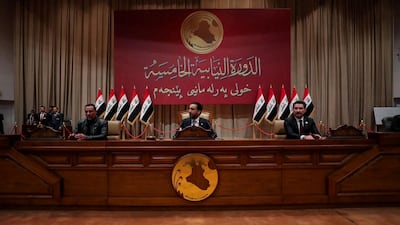A group of Iraqi Shiite political parties that includes Iran-backed militias has contested the outcome of the weekend's first parliament session after October elections.
The issue will be taken to the country’s Supreme Federal Court, a politician told The National.
The move by the Co-ordination Framework could further prolong the process of forming a new government, which officially started with Sunday’s session when the legislative body convened and re-elected the speaker and his two deputies.
paramilitary commander
Shortly after starting, the session was briefly adjourned when a quarrel erupted between the two main Shiite rivals, the Co-ordination Framework and the Sadrist Bloc, over the mechanism of announcing the largest bloc.
Constitutionally, once the largest bloc is announced, it is tasked with forming the new government.
Whether constitutional process will go ahead remains to be seen.
The eldest member of parliament who served as the acting speaker fell ill in the middle of the heated discussion and was taken to hospital.
The session was later resumed and led by the second eldest member, a move rejected by politicians of the Co-ordination Framework who walked out from the session.
They said that the eldest member, who is constitutionally required to chair the session, was absent and that it could not be resumed without him.
Politician Alia Nussayif said that the State of Law, the largest party inside the Co-ordination Framework, was contesting the outcome in court. She refused to provide more details.
Since the election results were announced in November, the Sadrist Bloc, sponsored by the populist Shiite cleric Moqtada Al Sadr, and the Co-ordination Framework have been at loggerheads and failed to reach a deal over the formation of the new government.
The Sadrists performed well during the vote, winning 73 seats in the 329-seat parliament, making the bloc the clear winner.
They are followed by Taqadum, led by Parliament Speaker Mohammed Al Halbousi, who won 37 seats.
Former prime minister Nouri Al Maliki’s State of Law bloc was third, with 33 seats. The Kurdistan Democratic Party took 31 seats while the Kurdistan Alliance led by its rival, the PUK, and the Iran-backed Fatah Alliance each won 17 seats.
At Sunday’s session, the Sadrists teamed up with Sunnis and the KDP to re-elect Mr Al Halbousi and two deputies, a Sadrist and a Kurd linked to the KDP.
Warning of violence
“I hold Sunnis and Kurds accountable for making a rift between the Shiites,” Ms Nussayif told a local TV station affiliated to a powerful pro-Tehran Shiite militia late on Monday.
“That rift could lead to blood, God forbid,” she said, before warning both Sunnis and Kurds that the “fire will catch them” if confrontations among Shiites erupted.
These threats were echoed by Abu Ali Al Askari, a spokesman for the Iran-backed Kataeb Hezbollah armed group, who issued a warning that “Iraq could see tough days and all will lose”.
Shortly before adjourning the session on Sunday, Mr Al Halbousi opened the door for presidential nominations, the second step in forming the government. It is customary for the president to be Kurdish.
According to the constitution, parliament has 30 days from the first session to elect the president, who will then ask the largest bloc to form a government within 15 days.
The main Kurdish parties, the KDP and the PUK, have yet to agree on a nominee but senior KDP official Fadhil Mirani hinted in statements in local media that the post will stay in PUK hands.
Iraq held early elections on October 10 in response to one of the core demands of a nationwide, pro-reform protest movement that erupted in 2019.
The elections were the fifth parliamentary vote for a full-term government since the 2003 US-led invasion that toppled Saddam Hussein.









